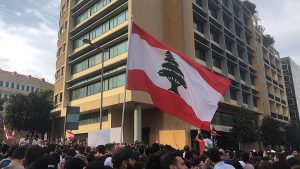Will the Lebanese political system succumb to coronavirus? While the multiple social movements started in autumn 2019 were paused to tackle the pandemic, the embers of protest are slowly reigniting.
The pandemic exacerbates the economic inequalities that are already unbearable for the vast majority of the population. No economic reforms were carried out since the end of the civil war, debt should reach 160% of GDP at the end of 2020 (it reached 155% at the end of 2019), the financial mechanisms put in place did not prevent a default payment last March and the devaluation of the Lebanese pound continues, triggering a rapid inflation. The governor of the Central Bank and the government blame each other in a country ranked 137th (out of 180) in Transparency International’s corruption ranking.
The Lebanese people are at the heart of the storm, in a boat without a rudder: poverty should soon hit 60% of the population; banks freeze assets, emphasising the feeling of dispossession felt by many small investors; the most marginalised groups, such as migrant domestic workers, face an alarming situation. Many of these workers saw their financial means suddenly vanish and while they arrived under the Kafala system, linking their residence permit to a contract with their employer, they are now without a job, resources or papers (as those are often seized by their employer). An estimated one million and a half Syrian refugees also live in Lebanon. Any worsening of the economic and/or sanitary situation would have dramatic consequences.
Faced with the urge to eat, wearing a mask soon becomes secondary, therefore fuelling the risk of a second wave. As dictated by necessity, the Lebanese people return to the streets and to social media to denounce – often in a creative manner – financial mismanagement and corruption.
To answer these movements, the government has so far decided to use force. Since the beginning of the protests, the police have made violent and arbitrary arrests denounced by human rights organisations. The authorities use the security apparatus, juggling between the different bodies of a complex confessional system, to silence human rights demands.
Can the responses from the authorities in the next few weeks appease the situation? The first measures do not seem to take this route.

